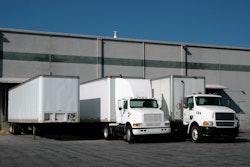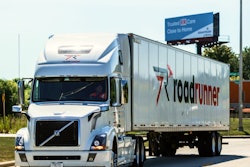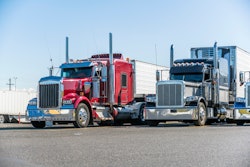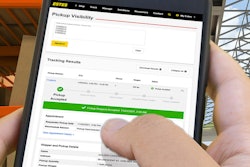Trucking is ever-evolving, driven by technology and consumer demands, while facing ongoing challenges in fleet management, efficiency and safety. Amid these pressures, leaders often neglect a critical risk: non-compliance with federal registration regulations.
Registrations look different in every state
This is a source of confusion for many trucking company owners and logistics professionals, it’s an aspect that we see being overlooked on a near-daily basis. Struggling to comply with federal regulations and properly register can result in hefty fines, penalties and legal repercussions — the last thing any business owner wants.
Interstate vs. intrastate registration
Depending on where you plan on operating, it’s best to have a deeper understanding of not only the types of trucks you’ll rely on, but also the proper licensing, registrations, regulations and more. Whether your operations span states or countries, here are some things to consider.
Interstate
As transportation and operating laws differ by state, staying updated is crucial, especially for out-of-jurisdiction changes. Knowing current speed limits, cargo weight restrictions, and underride guard requirements helps avoid tickets, fines, license revocations, and operational bans.
Anytime you’re crossing state lines with cargo, you’ll need an interstate operating authority. This starts with an official identification number from the Department of Transportation. You will likely have to register with the specific state to operate commerce in that jurisdiction – just like any other company expanding its market across state lines.
Next, you’ll need to ensure your fleets are registered under the Unified Carrier Registration (UCR) Act and remember to adhere to the International Fuel Tax Agreement (IFTA) and International Registration Plan (IRP).
Utilize government websites and legal resources and stay connected with professional associations and industry publications for updates. Networking with professionals and consulting legal experts can also provide valuable guidance on specific matters as they arise.
Intrastate
If you or one of your employees plans to operate in one state only, beware of state and local laws, as they’re bound to change from location-to-location. Some states, like Connecticut, Indiana, Kentucky, Maine, North Carolina, Pennsylvania, Utah and West Virginia, all require separate intrastate fuel permits. Many southern states even require secondary inspection, which confirms proper registration is intact.
Homeland Security calls the shots
If you’re like me, you’ve experienced challenges with obtaining necessary information and approvals from the Department of Homeland Security, an important player in international ports of entry.
To prevent the illegal transport of contraband, people, or other prohibited items across state and international lines, DHS authorizes licenses based on specific criteria, providing an extremely limited amount of licenses provided each year. The type, scope of application, and time requirements will depend on a multitude of factors and variables. It’s best to hire industry tested employees and professionals to help guide you through this complex maze. Your customer expects you to be fully licensed and operational when they enter into a contract with you. Do not stick your head in the sand and take this responsibility lightly.
Failed to comply? Here’s what to expect
If drivers aren't properly registered, they can expect to incur costly fines, penalties, and fees. This can cause a huge detriment to your organization, hindering credibility and financial growth.
The truth is, a variety of different governmental agencies can shut your business down. From failing to secure proper international licensing from DHS to entering a union town as a non-union trucker, to illegally transporting waste, there are no shortage of possibilities that could impact your business.
Keep things running smoothly with a team you can trust
When business owners embark on their trucking journey, it's common to initially focus on intrastate operations, but broadening horizons is key.
Embracing the industry's international growth opportunities, businesses can thrive by prioritizing continuous learning and building knowledgeable teams. Stay informed through reputable sources, ensuring your team is well-equipped to tackle challenges and seize new opportunities.
In today's intricate trucking landscape, proper registration is pivotal for sustaining business operations. Given the increasing complexity, partnering with a seasoned legal team is a strategic move. Their expertise in navigating the national regulatory framework ensures tailored solutions, safeguarding the seamless flow of operations. A law corporation with proven experience in the industry will equip you with the knowledge you need to remain successful and compliant.













